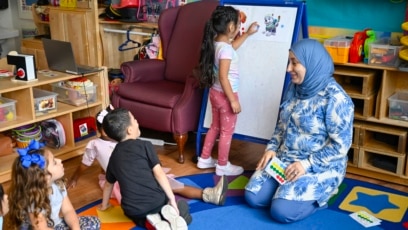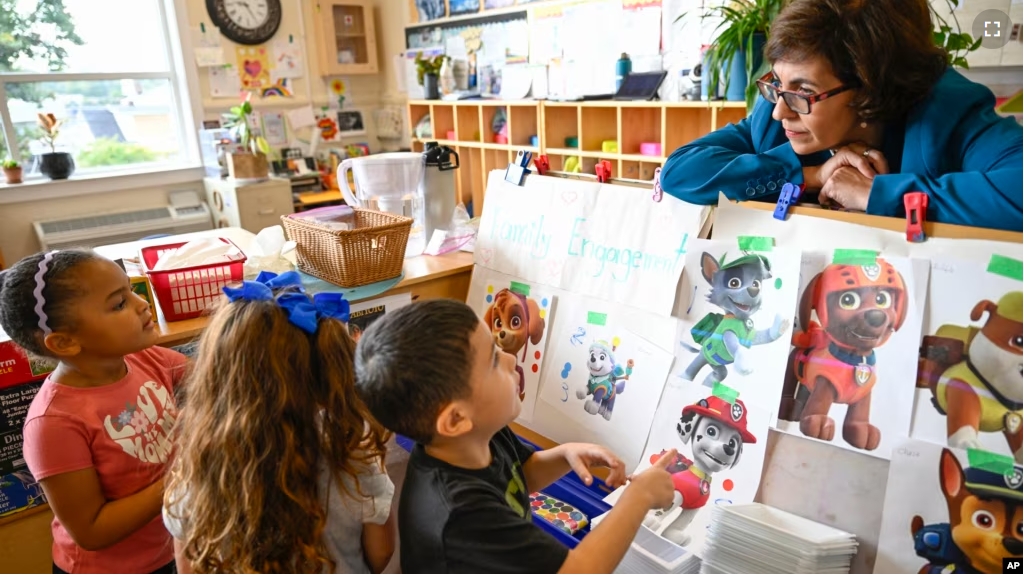Early education expert Dan Gartrell says the most important civics lesson that preschools can teach is “social democracy.”
Gartrell wrote a book about teaching democracy to preschoolers. It is called Education for a Civil Society. The book is used by the ACCA Child Development Center near Washington, D.C. in Northern Virginia.
Gartrell said this teaching “starts with appreciating each member of the group as a worthy member and worthy of expressing thoughts and ideas.” He said after that, children can learn to treat others with kindness to solve conflicts and negotiate difficult situations by using words that do not hurt other people’s feelings.
Rachel Robertson is chief academic officer for Bright Horizons. The company operates preschool centers around the world. It uses democratic ideas in its education.
Robertson said that a child starts to be a “real community member” at around age three or four. She said the child starts “contributing to the classroom community and thinking a little bit broader about the world.”
At ACCA in Virginia, children are given a lot of autonomy. There are hours spent doing free play. Children vote on what they study and eat.
On a recent day, one classroom had just finished studying sand because the children wanted to know about it after they visited beaches over the summer. The children also tried different apples and voted on which apples the school should order.
The ACCA said the decision-making process is meant to affirm to children that their thoughts and the thoughts of their classmates are valuable.
Reporters with the Associated Press recently visited an ACCA classroom. The reporters found the children taking a vote on who the best character was on Paw Patrol, an animated TV series.
The three- and four-year-old children were choosing between two finalists: a German shepherd named Chase who wears a police uniform, and Skye, who wears a pink “pup pack.”
Educators at ACCA say they are teaching ideas of civics to students early. Their goal, they say, is to raise good citizens and strengthen democracy.
The students are not learning about the structure and rules of government. But teachers say they are working with students on how to solve problems with classmates, how to deal with anger or disappointment and how to think of the needs of others.
Mary Folks is a teacher at ACCA. She said, “We’re all here to help develop these children to become better citizens…to be better problem-solvers and to be better equipped socially, emotionally…”
María-Isabel Ballivian is the preschool’s executive director. She said she looks for ways to remind students that they are American. For example, she holds a large Fourth of July gathering.
Ballivian said, “If we give them now a sense of belonging, that’s going to be a tool that they will have to become resilient once they face discrimination.”
Ballivian added, “I don’t see how we can change the adults…But I do know, if we work hard, we can prepare our children for a better future.”
As for the class vote at ACCA, they narrowly supported Skye in their vote for best Paw Patrol character.
I’m Mario Ritter, Jr.
Moriah Balingit, Nathan Ellgren, and Almaz Abedje reported this story for the Associated Press. Mario Ritter, Jr. adapted it for VOA Learning English.
Quiz – Preschools Aim to Make Students ‘Better Citizens’

Start the Quiz to find out
___________________________________________
Words in This Story
appreciate –v. to be able to understand in some way
worthy –adj. valued enough to merit a person’s time, effort or concern
contribute –v. to personally add to value to something or someone else
autonomy –n. the ability to act independently without external help
character –n. a person or creature that appears in a movie, TV show, play or cartoon
animated –adj. relating to movie or TV cartoons which have the appearance of moving pictures rather than film or video
resilient –adj. able to recover from injury, damage or disease
